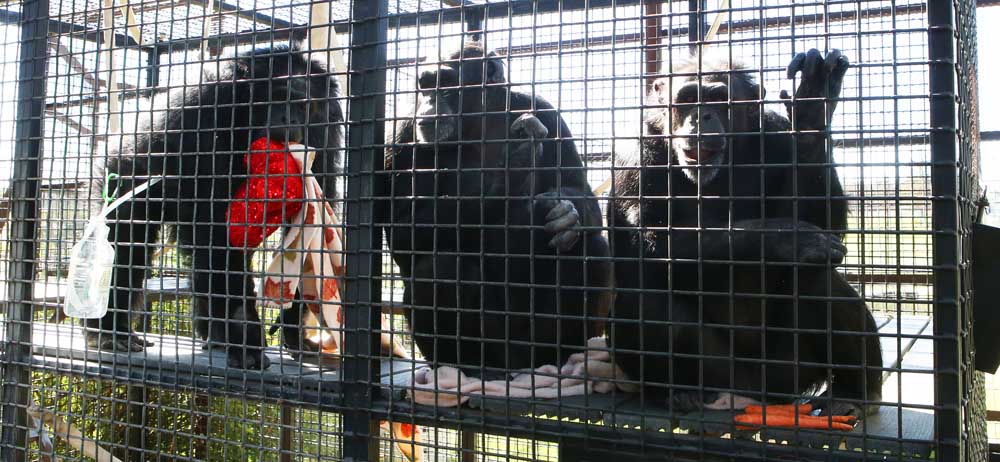With chimpanzees in the public eye, local sanctuary emphasizes advocacy
Published 5:45 am Saturday, August 31, 2024

- Alpha male Herbie, from left, and females C.J. and Emma gather together while socializing at the Freedom for Great Apes chimpanzee sanctuary in Tumalo on Wednesday morning.
Herbie fluffed out his blanket, smoothing out the edges before plopping down to get comfortable. He lifted his red-sequined bowler hat and twirled it around in his hands, watching it sparkle in the morning sun.
He put it on before laying on his back to leaf through a new magazine, carefully tearing out pages with pictures he liked.
Trending
Though Herbie may seem human, he’s not. He’s a 38-year-old chimpanzee.
Herbie is one of four chimps living at Freedom for Great Apes, formerly known as Chimps Inc., a chimpanzee sanctuary in Tumalo.
Chimpanzees are having a moment in the public eye.
A new docuseries out this month on HBO — think “Tiger King,” but with apes — highlights how bizarre and dangerous it can be to keep chimps as pets. A bill sponsored by U.S. Rep. Earl Blumenauer, D-Portland, seeks to bar breeding and selling of chimps, monkeys and other primates. And the Tumalo sanctuary continues to care for four chimps rescued from private ownership with a main mission and philosophy: Chimpanzees should not be pets.
Local sanctuary
Herbie arrived at the sanctuary at age 12 in 1998, said Kim Helmer-Dias, executive director of Freedom for Great Apes. Before that, he was taken from his mother at a breeding facility and sold as a pet.
Trending
He was kept in a house, forced to perform at parties. When he grew too big and strong, he was kept in a cage for years before arriving in Tumalo.
Now, Herbie lives with two female chimps, Emma, 22, and C.J., 25, and a male, Jackson, 23. Like humans, they each have their own habits and backstories.
Prineville’s Skydog Ranch ranch serves as wild horse haven
Emma arrived from an animal facility in Texas. C.J. was born in Las Vegas in the entertainment industry. Jackson was castrated by his owner in hopes he wouldn’t be as strong without testosterone, which didn’t work.
The chimps are given daily enrichment such as food puzzles, blanket forts and opportunities to forage. Their space is 3,000 square feet with aerial tunnels connecting three outdoor enclosures and two indoor facilities.
Their chimp needs, aside from being in the wild, are being met, said Helmer-Dias.
Chimps Inc. was started in 1995 by Lesley Day, mother of celebrity chef Brian Malarkey and aunt of Helmer-Dias. Day was interested in buying a chimp as a pet, Helmer-Dias said.
After research, Day discovered private ownership of chimps was dangerous for both the animal and humans. Instead, she decided to start a sanctuary.
Freedom for Great Apes’ goal is to advocate to protect chimps, which have officially been endangered since 2015. But the sanctuary is not without its own history of danger.
Chimps Inc. apes will remain in Tumalo
When the sanctuary was Chimps Inc. under Day’s directorship, it faced safety and labor violations after employees and interns reported being attacked, including having fingers bitten off by chimps.
Oregon Occupational Safety and Health administration reported employees “were exposed to physical harm including, but not limited to, amputations, choking, grabbing and biting from chimpanzees,” according to a Bulletin report.
Many of the safety issues were caused by Day’s close relationship with chimpanzees and failure to follow the sanctuary’s protocols, OSHA reports said.
Day stepped down in 2017, but ongoing conflict over the mission and leadership of the organization led to Day evicting the sanctuary from her property, a short-lived plan to transfer all chimps to a facility in Iowa and finally the dissolution of Chimps Inc. while a new nonprofit, Freedom for Great Apes, was formed and stepped in to manage the sanctuary.
Freedom for Great Apes emphasizes safety through communication. All employees and volunteers always have access to a radio for communication and one employee holds enclosure keys at a time, along with other protocols.
It takes training, time and consistency, said Helmer-Dias.
“If an accident happens in captivity, it’s most likely going to be human error,” Helmer-Dias said.
‘Chimp Crazy’
“Chimp Crazy,” directed by Eric Goode of “Tiger King,” was recently released on HBO Max and follows a story of exotic animal broker Tonia Haddix and her obsession with chimps.
“It’s like your love for god,” Haddix said of chimpanzees in the show.
Haddix raised Tonka, chimp from movies “George of the Jungle” and “Buddy,” as she would a baby, as seen in the show. He lived in the house in his own bedroom, slept in a bunk bed and watched TV.
Later, Haddix started what she called a sanctuary in Missouri, without any prior training to care for the primates, including veterinary care. The seven chimps she housed were fed junk food like McDonald’s Happy Meals and sugary drinks, footage shows.
The show brings attention to the dangers of owning chimps as pets.
OSHA report notes violent chimp attacks at Tumalo sanctuary
When chimps boomed in the entertainment industry in the ‘80s, so did breeders. But at age 5, chimps become too strong to handle.
“By that age, they are too strong, too strong minded, too strong physically,” Helmer-Dias said. “They want to do what they want to do, and you can’t stop them.”
Chimps’ instinctive habits are quite the opposite from humans, said Helmer-Dias. People often teach chimps to smile. But for a chimp, smiling is known as a “fear grimace,” which displays extreme distress and fear to other chimps.
Chimps also yell, bite and fight as a way of solving disputes. It’s not uncommon to see chimps with missing toes and chunks gone from their ears.
These are normal occurrences in how they interact in the wild, and that doesn’t stop in captivity.
“There’s some pretty harsh things out there about chimps and their strength, which is true, they are very strong, and that’s part of the problem,” Helmer-Dias said. “(It’s) not fair to put that on them in an unfair situation, that, in the end, is going to be their fault, because we’ve put them there.”
Chimp sanctuaries in the Northwest host discussions after “Chimp Crazy” episodes air each week, which Helmer-Dias attends. The series is tough to watch for sanctuary workers, whose lives are committed to protecting these beings.
Episodes detail incidents of chimps attacking their owners or other visitors at houses, oftentimes resulting in the chimps getting killed, such as happened to a chimpanzee who attacked its caretakers in Pendleton in 2021.
“I also think that this HBO series is not necessarily for the people who have done their research,” Helmer-Dias said. “It’s going to be for the people that will maybe catch their eye and bring awareness to this situation.”
Helmer-Dias hopes awareness comes from the show, that people understand that primates do not make good pets.
Captive Primate Safety Act
Laws vary from state to state for private ownership of primates, which includes chimps, monkeys, lemurs and more. In Oregon, it’s illegal to own primates.
Right now, the Captive Primate Safety Act bill is in Congress, reintroduced this year by Blumenauer and Rep. Brian Fitzpatrick, R-Pa. Sen. Richard Blumenthal, D-Conn, has sponsored a similar bill in the Senate. If passed, the bills would ban selling, buying, shipping and breeding the animals.
“We want the bill to pass,” Helmer-Dias said. “We want it to be illegal to transport exotic pets from state to state and have pet ownership. Then there would be no need (for sanctuaries).”
There is no definite number of primates kept as pets in the U.S., but it’s estimated to be in the thousands or tens of thousands, according to Kate Dylewsky, assistant director of government affairs for the Animal Welfare Institute, a nonprofit.
If the legislation passes, breeding, buying and trading primates would be illegal, Dylewsky said. Current owners would be allowed to keep their primates until the primates die.
“There’s just a huge risk to not only the owners, but also the community around them,” Dylewsky said. “That includes first responders who have to put their own safety on the line to respond when one of these primates gets out.”
Chimps bred in captivity cannot return to the wild, said Helmer-Dias. They cannot survive on their own and could introduce new diseases to wild species.
At some point, sanctuaries wouldn’t be necessary, said Helmer-Dias, and that’s the goal.
Editor’s note: This article has been corrected. The original version misstated the number of chimps kept as pets. The Bulletin regrets the error.








